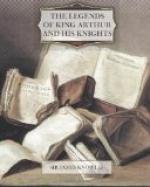[Illustration: By the time they had finished drinking they loved each other so well that their love never more might leave them.]
Then they sailed onwards till they came to a castle called Pluere, where they would have rested. But anon there ran forth a great company and took them prisoners. And when they were in prison, Sir Tristram asked a knight and lady whom they found therein wherefore they were so shamefully dealt with; “for,” said he, “it was never the custom of any place of honour that I ever came unto to seize a knight and lady asking shelter and thrust them into prison, and a full evil and discourteous custom is it.”
“Sir,” said the knight, “know ye not that this is called the Castle Pluere, or the weeping castle, and that it is an ancient custom here that whatsoever knight abideth in it must needs fight the lord of it, Sir Brewnor, and he that is the weakest shall lose his head. And if the lady he hath with him be less fair than the lord’s wife, she shall lose her head; but if she be fairer, then must the lady of the castle lose her head.”
“Now Heaven help me,” said Sir Tristram, “but this is a foul and shameful custom. Yet have I one advantage, for my lady is the fairest that doth live in all the world, so that I nothing fear for her; and as for me, I will full gladly fight for my own head in a fair field.”
Then said the knight, “Look ye be up betimes to-morrow, and make you ready and your lady.”
And on the morrow came Sir Brewnor to Sir Tristram, and put him and Isault forth out of prison, and brought him a horse and armour, and bade him make ready, for all the commons and estates of that lordship waited in the field to see and judge the battle.
Then Sir Brewnor, holding his lady by the hand, all muffled, came forth, and Sir Tristram went to meet him with La Belle Isault beside him, muffled also. Then said Sir Brewnor, “Sir knight, if thy lady be fairer than mine, with thy sword smite off my lady’s head; but if my lady be fairer than thine, with my sword I will smite off thy lady’s head. And if I overcome thee thy lady shall be mine, and thou shalt lose thy head.”
“Sir knight,” replied Sir Tristram, “this is a right foul and felon custom, and rather than my lady shall lose her head will I lose my own.”
“Nay,” said Sir Brewnor, “but the ladies shall be now compared together and judgment shall be had.”
“I consent not,” cried Sir Tristram, “for who is here that will give rightful judgment? Yet doubt not that my lady is far fairer than thine own, and that will I prove and make good.” Therewith Sir Tristram lifted up the veil from off La Belle Isault, and stood beside her with his naked sword drawn in his hand.
Then Sir Brewnor unmuffled his lady and did in like manner. But when he saw La Belle Isault he knew that none could be so fair, and all there present gave their judgment so. Then said Sir Tristram, “Because thou and thy lady have long used this evil custom, and have slain many good knights and ladies, it were a just thing to destroy thee both.”




